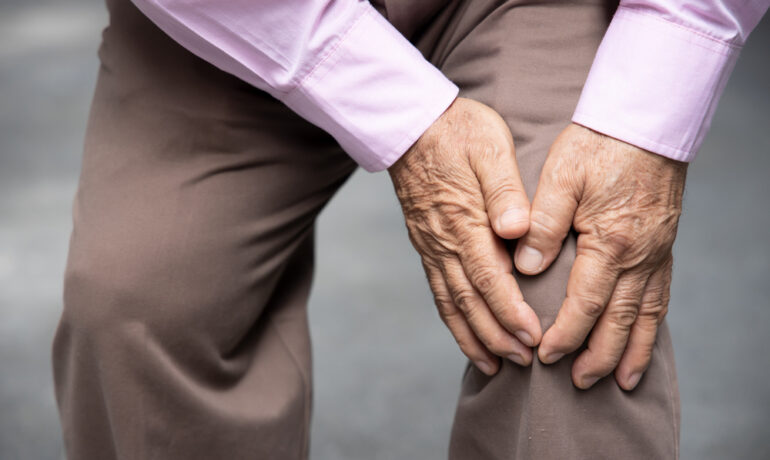Most people look forward to a glass of wine or a beer after work, but for some, this simple pleasure comes with a hefty price: gout. Alcohol and gout have a complex relationship, and understanding the link is key to managing this painful condition.
Gout is a form of arthritis caused by the accumulation of uric acid crystals in the joints, which leads to inflammation and intense pain. Approximately 9.2 million people in the U.S. suffer from gout.1 While several factors contribute to developing gout, one notable influence is the consumption of alcohol.
Understanding how alcohol affects gout is crucial for those at risk and can guide lifestyle choices to manage or prevent the condition.
Understanding Gout: Causes and Symptoms
Gout occurs due to the buildup of uric acid, which is a natural waste product formed when the body breaks down purines. Normally, uric acid dissolves in the blood and exits the body via urine. However, for some people, it can accumulate faster than the body can get rid of it — this condition is called hyperuricemia.
When uric acid accumulates, it forms sharp, needle-like crystals in the joint, causing episodes of severe pain, swelling, and redness. These gout attacks can vary in frequency and intensity but often occur suddenly at night.2
But what triggers this condition, and how can you recognize it early? Here’s a breakdown of the main causes and symptoms:
- Genetic Predisposition: Family history plays a role in gout risk. If close relatives suffer from gout, your chances of developing the condition may increase due to inherited metabolic traits.3
- Dietary Choices: Consuming foods high in purines — such as red meat and certain types of fish — can spike uric acid levels. Sugary and alcoholic beverages, especially beer, are additional risk factors.4
- Obesity and Metabolic Syndrome: Excess body weight increases uric acid production and reduces the kidneys’ efficiency in removing it. Obesity also contributes to insulin resistance, further complicating uric acid elimination.5
- Medical Conditions and Medications: Chronic illnesses such as kidney disease and hypertension can elevate gout risk. Additionally, diuretics and aspirin may interfere with uric acid excretion.5,6
The Role of Uric Acid in Gout Development
Every gout attack can be traced back to one key factor: excess uric acid.
Uric acid forms when purines, compounds found in various foods and drinks, are metabolized. Normally, the kidneys filter out uric acid — but an imbalance occurs if the body produces too much uric acid or the kidneys excrete too little.
When uric acid builds up, it crystallizes and settles in the joints, causing inflammation and severe pain. These crystals can also form in tissues, causing tophi, which are hard nodules visible under the skin. If left untreated, uric acid can lead to long-term joint damage.
How Alcohol Consumption Influences Uric Acid Levels
Alcohol intake is a significant risk factor for recurrent gout attacks, as it can interfere with the removal of uric acid from the body.7 Drinking alcohol, especially beer, increases uric acid production by accelerating the breakdown of purines. It also elevates serum urate levels, which can cause gout through hyperuricemia.8
Greater Alcohol Intake Tied to Higher Gout Risk Among Both Men and Women
A recent study published in JAMA Network Open highlights the connection between alcohol consumption and an increased risk of gout in both men and women.8,9
Researchers from Suzhou Medical College of Soochow University analyzed data from over 400,000 participants in the U.K. Biobank. The findings showed that current drinkers, particularly men, experienced a significantly higher risk of developing gout compared to individuals who never drank. Additionally, the risk escalates with higher total alcohol intake, especially in men. Women saw a smaller but still substantial increase in risk.
The researchers suggest that the observed differences in gout risk between the sexes could be attributed to variations in the types of alcohol typically consumed by men and women. Men tend to consume beer, which has a higher purine content, while women often opt for wine or spirits, which may carry slightly lower risks.
Choose New Jersey’s Best Rheumatologist for Gout Management
Living with gout can be challenging, but you don’t have to face it alone. At ARBDA, we have a team of leading rheumatologists in New Jersey who specialize in gout treatment. We understand the complexities of gout and are committed to providing each patient with a personalized treatment plan that includes medication, lifestyle recommendations, and support. Our goal is to help you manage your symptoms and achieve long-term health.
If you are experiencing symptoms of gout or need help managing the condition, schedule an appointment with one of our gout specialists today. Our team is here to help you every step of the way in your journey to better joint health.
1https://jamanetwork.com/journals/jama/fullarticle/2787544
2https://pmc.ncbi.nlm.nih.gov/articles/PMC4360969/
3https://pmc.ncbi.nlm.nih.gov/articles/PMC3645862/
4https://pmc.ncbi.nlm.nih.gov/articles/PMC9459802/
5https://pmc.ncbi.nlm.nih.gov/articles/PMC6034249/
7https://www.amjmed.com/article/S0002-9343(06)00164-1/fulltext
8https://jamanetwork.com/journals/jamanetworkopen/fullarticle/2822906
9https://www.rheumatologyadvisor.com/news/greater-alcohol-intake-tied-to-higher-gout-risk/

